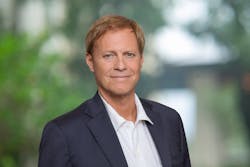Storm Water Solutions 2022 Industry Icon: Leading By Example
When Marc Theisen entered the industry, he said erosion control measures were an afterthought. It was before the U.S. EPA had issued NPDES Phase I permitting, but even then, Theisen knew he wanted to be part of it. Theisen, vice president of Business Development and Technical Services for Profile Products, is SWS’ 2022 Industry Icon. In the nomination form submitted on Theisen’s behalf, his nominator wrote “..it’s likely if you say his name, many erosion control professionals will know who he is because of his legacy.”
Theisen has worked in many branches of the industry – contractor, consultant, distributor, manufacturer. He has served as technical vice president of the International Erosion Control Association Board (IECA), where he was an original member of the IECA Standards and Practice Committee. Theisen is a founding member of the Erosion Control Technology Council (ECTC) and a past ECTC Chairman; served on its board of directors; served on the Board of Directors for the Geosynthetic Institute (GSI); was involved with ASTM, now ASTM International, and EnviroCert International; and was a founding and an executive member of the Geosynthetic Materials Association (GMA). In 2021, he received the Sustainted Contributor Award from IECA.
Theisen is credited on five related patents for hydraulically applied erosion control products, biotic soil media, sediment retention devices and turf reinforcement mats.
The Journey
Theisen was always used to working around the environment. His family built silos that stored coal, so when he was younger, he was no stranger to being around mines, and he thought to himself ‘somebody really needs to clean up these disturbances of the mines.’
Fast forward to when Theisen was earning his Master’s degree in plant ecology. He ended up getting a grant and doing his thesis at Black Thunder Mine in Wyoming. When Theisen graduated, he found a job in The Denver Post for an erosion control superintendent. A week later, he was driving tractors, rolling out erosion control blankets and throwing around hay barrels.
After a few years, he decided he did not want to be in the field all day or be gone for weeks at a time, so he switched to the distribution side of the industry. He worked at both local and national levels and started the geosyenthic and erosion control businesses for the company now known as Propex.
When Phase II of the NPDES program came into play, it changed things.
“That really was the legislative driver that pushed the industry because people finally connected erosion control with storm water quality, and really, that’s why we do erosion,” he said.
But, still, Theisen said he is seeing erosion control and storm water measures being considered afterthoughts to projects, and unfortunately, sometimes that means when project funding gets cut, so do the erosion and storm water controls.
As for current industry challenges and important topics, Theisen notes a few, ranging from microplastics to pollinators.
“We’re doing a fair job of controlling erosion,” he said. “Now, we’ve got to do a better job of selecting technologies that are safer for the environment.”
He is also working to promote the creation of sustainable cover systems that are functional ecosystems for landfills and fossil plant closures.
“All that comes back to putting together air, water and soil. Three of the fundamental elements or things that we need to live with,” he said.
Continuing Education
And one thing that can aid in all of these challenges, is furthering education both for those in the industry and outside of it. Theisen said education is crucial, which is why he is often found presenting at conferences or hosting webinars. And not only does he serve as a speaker, Theisen often sits in on sessions as an attendee at conferences.
“A lot of people just go there [to conferences] and hang out in the exhibit hall, and I spend less and less in the hall and more and more time in the learning areas,” he said.
When Theisen first switched over to the sales and distribution side, someone told him, “you should be a teacher.” What Thiesen said this man really meant was “you’re not very good at selling,” but Theisen does not disagree.
“I’m not a salesperson,” he said. “I’m more of a technical and marketing person, and I really want to be out in front of the industry trying to see where it’s headed, where it should head and try to steer it.”
On top of education, Theisen noted how vital mentorship can be too. There are a few mentors who he feels indebted to, including his late father. On the other side, Theisen is happy to mentor others in the industry given his history and front-row seat in watching the industry evolve. Add in the fact that the industry helps the environment too, and it is a win-win situation in Theisen’s book.
“That’s what’s really gratifying about being in this business is that, it’s not like being a super highly paid professional, but there’s a lot of satisfaction out of it, knowing you’re helping people solve problems, and you’re helping the environment,” Theisen said.
What’s Next
Looking forward, Theisen plans to continue mentoring and educating those in the industry along with pushing forward research.
“I’ve had a great career,” he said. “I’ve been so fortunate. Every job I’ve taken, with the exception of one, has been another stepping stone. I told one of my colleagues ‘I’ve work with companies in their golden ages like four straight times now.’ And he said, ‘that’s not luck, Marc. Maybe you were part of that.’ So that makes me proud."
About the Author
Katie Johns
Editor-in-Chief
Katie Johns, editor-in-chief of Stormwater Solutions, graduated from the University of Missouri in 2016 with a Bachelor of Journalism and a Bachelor of Arts in Spanish. Johns joined the Stormwater Solutions team in September 2019. Johns also helps plan the annual StormCon conference and co-hosts the Talking Under Water podcast. Prior to entering the B2B industry, she worked as a newspaper reporter and editor in Sarasota, Florida, and a magazine assistant editor in the Chicago suburbs. She can be reached at [email protected].

